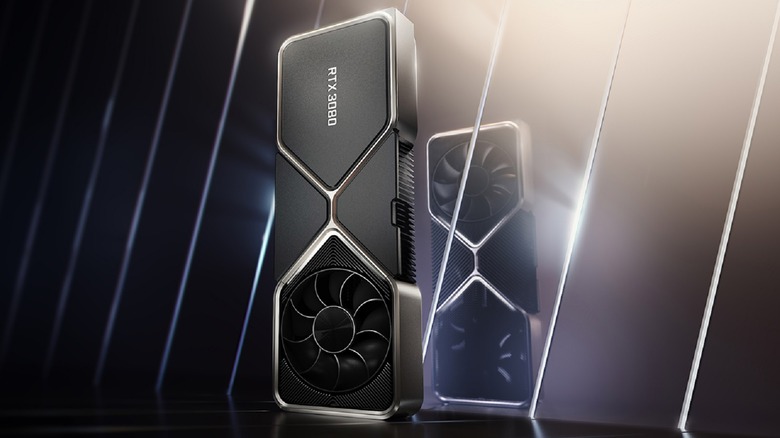What The RTX 30 Series Really Means For Gaming
There has always been a lot of value in PC gaming, and that's mostly because you can choose from any number of graphics cards that target a wide array of capabilities. If you're totally fine playing at low settings and 30 frames-per-second, there's a card for you. If you want to play the latest and greatest titles totally maxed out in 4K, there's a card for you, too.
For a long time, most PC gamers have lived somewhere in the middle. According to Steam, the most popular graphics card to this day remains the GTX 1060, which debuted in July 2016 at a price of $249. Back then, and even up until very recently, higher end options were simply too expensive for most.
The mission of Nvidia's GeForce RTX 30 series, it seems, is to bring higher-level performance down to a price that's much easier to swallow.
The glowing example of this lies in the RTX 3070. This card is built on Nvidia's new Ampere architecture, as all the 30 Series cards are, and aims to be the standard 4K, 60 frames-per-second option for gamers. According to Nvidia's own benchmarks, it plays Control at over 100 frames-per-second at 1440p, and that's with ray-tracing on. In terms of power, Nvidia itself claims the RTX 3070 is "faster than the $1,200 GeForce RTX 2080 Ti."
The RTX 3070 has a starting price of just $499. Not only is that far cheaper than the 2080 Ti it reportedly supplants, it's also incredibly affordable for the power it provides. If you're looking to build a gaming PC for the long haul, $499 is not a lot to ask for the many years of service you'll get.
It shouldn't come as a surprise the RTX 3070 is priced where it is. One has to wonder if Nvidia was tipped off as to where the Xbox Series X and PlayStation 5 might land in terms of cost. You can imagine some PC gamers would've looked at those machines — both claiming to play ray-traced games in 4K at 60 frames-per-second – and wondered whether they should spend $500 on a console or another $1,000 on a graphics card.
It's also possible that Nvidia forecasted some increased competition from AMD, which has traditionally tried to price its Radeon series cards below similar products from Nvidia. AMD's new RDNA 2 GPU architecture is already present in the new consoles coming this holiday. Perhaps the RTX 3070 is Nvidia acknowledging that it needs to keep a powerful card in the mix, just in case AMD offers a comparable RDNA 2-based card at a very low price point.
The RTX 3070 isn't Nvidia's only new card, by the way. If PC gamers aren't averse to spending a little more, the RTX 3080 isn't all that far a leap. For $699, the 3080 is essentially a lock for playing games at 4K and 60 frames-per-second, even with RTX on. Not only that, it boasts faster video memory and more of it. And then there's the RTX 3090, which looks to become the new absurdly expensive enthusiast option. Starting at a whopping $1,499, the 3090 is the card for those who want to play games in 8K at 60 frames-per-second. How many people even own an 8K display right now? Who knows. But the RTX 3090 should be more than ready for the day that level of high-resolution gaming becomes mainstream.
It's clear, though, that the RTX 3070 is the real star of the show. Though Nvidia insists the 3080 is its new "flagship," it seems like the RTX 3070 is going to offer the most value for gamers who are solidly on Team Green. It'll allow those mentioned earlier — those Steam players still rocking the GTX 1060 — to upgrade for the price of an Xbox Series X. They'll still have all their PC games at the ready, and they'll have a solid card that can play graphically demanding games for years to come.
Not only that, but the RTX 3070 could drive even more competition between Nvidia and AMD, and push costs even lower as a result. When PC gaming power becomes cheaper, more gamers can afford to move from the low end to something more mid-range, or potentially even higher. That's good for developers, who — bless their hearts — still have the GTX 1060 to think about. And it's good for gamers, who are bound to have better experiences as a result.
The RTX 3070 arrives sometime in October and starts at $499. The RTX 3080 goes on sale Sept. 17 at a price of $699. The RTX 3090 launches on Sept. 24 for $1,499.

